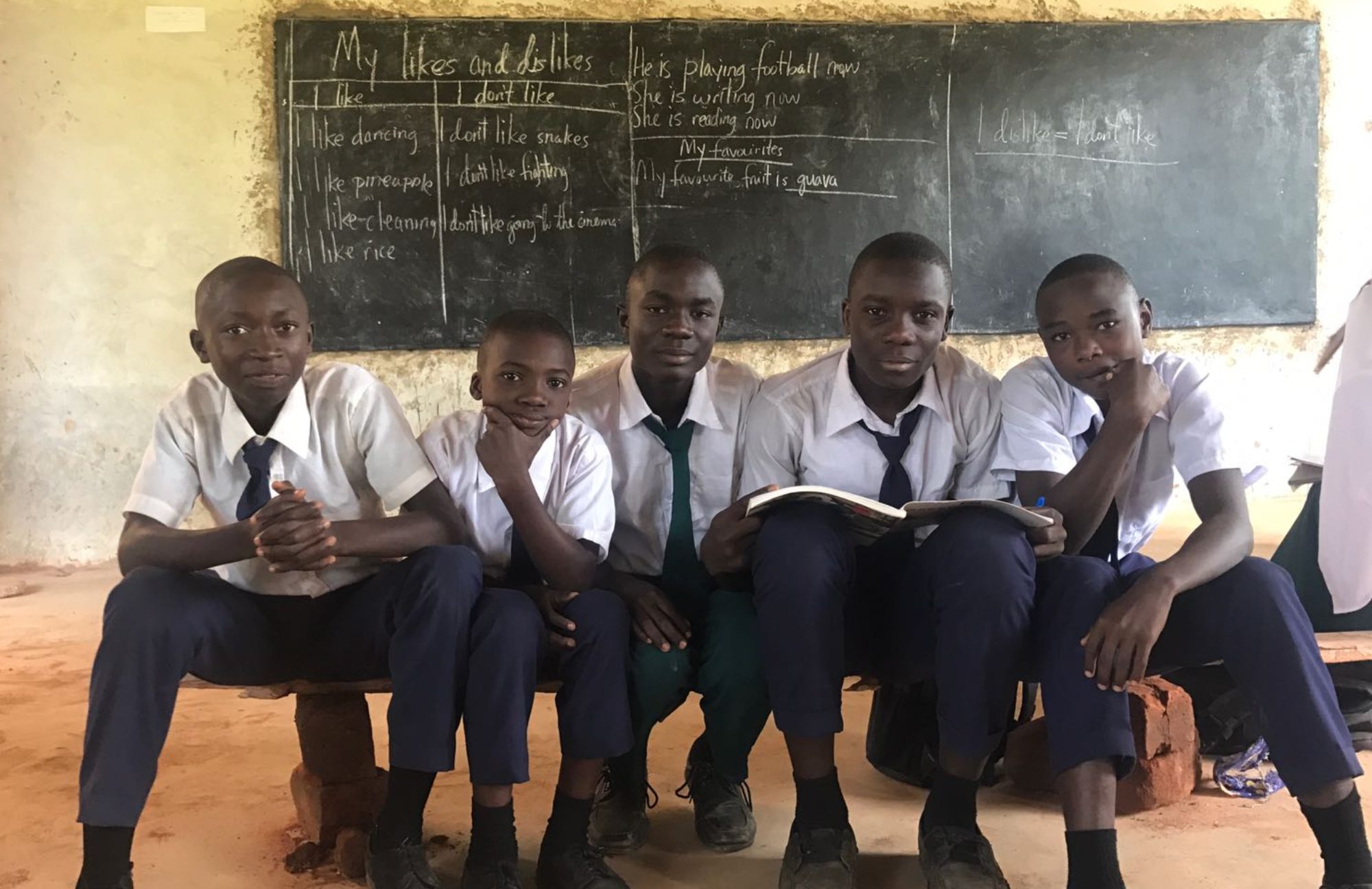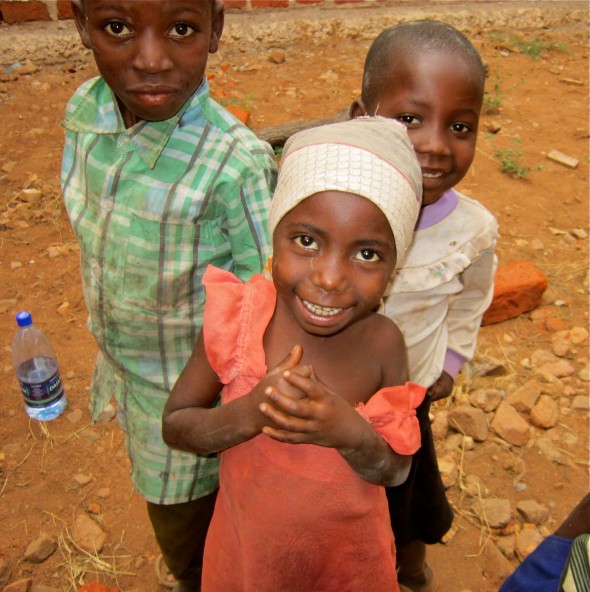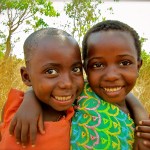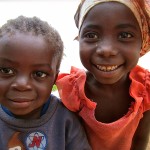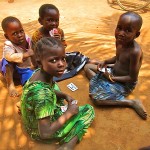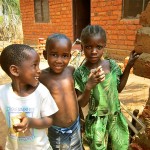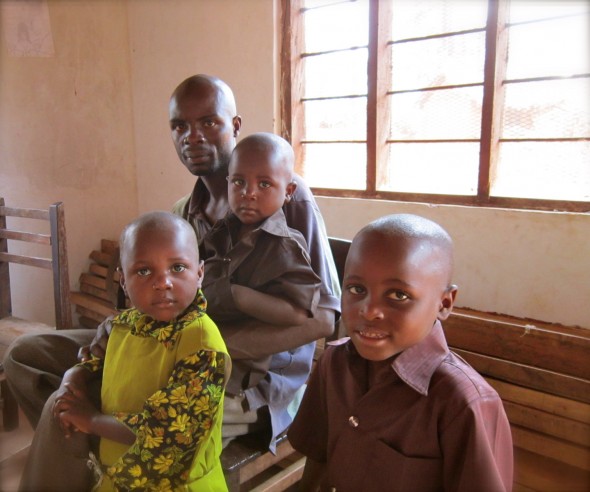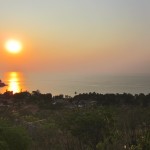It was so great to arrive back in Kigoma! Lucas met me at the airport and we were both glowing to see each other again. He’s really become like a brother to me, and the fact that ‘Dada Rai’ is how he and most others refer to me (Sister Rai), well it just always feels great to come back – like coming to one of my many homes around the globe. Lucas and I came up to the hotel to drop my things and then we headed to town to have lunch. I gave him his new Project Wezesha shirt and prints of all the photos that he’s taken over the past year – and some from my trip last year. We caught up on the gaps between emails over the past year and I got the scoop on folks we know.
The best update was that our friends Ashahadu and Jane had a baby girl, Sifa and that she’s lovely and doing fine. When I went to meet her in the village, I saw just how fine she is – her Rai-given nickname will easily be ‘Tank’ and eating is clearly not a problem for her. She’s a big beauty with huge eyes and a full belly!
The worst update was that our watchman, who keeps an eye on the school, the ‘store room’, tools, materials, etc. lost his wife last year and then his infant baby last month. Last August his wife died from complications due to the dreaded obstructed labor that plagues so many women – in developed and developing. The key difference between the two contexts being the more highly trained doctors and therefore successful surgeries in the hospitals in developed regions of the world.
Here, Kalekwa’s wife was giving birth at the dispensary in the village and, as Lucas put it, the baby was coming out “randomly” – first a leg, then … Eventually, baby was born alive but the mother died. Poor Kalekwa is a young father with three children ages 7, 5, and 3 years and now an infant. Fortunately, relatives stepped in to help raise the children, including the newborn. I’m not sure why, but last month, at almost a year old – the baby died suddenly. That’s really all anyone knows about that. So, Kalekwa is so sad but life goes on and he has some support – but my heart goes out to him and the little ones. The village births seem like such a gamble! I also learned that his brother also lost his wife in childbirth due to similar circumstances. Then I found out that Jane had Sifa while squatting behind their house! If she died ….. oh, the thought pains me. I hope they have their next child at Maweni hospital in town!
The day after arriving, Lucas and I visited Mgaraganza village – mainly so I could check out the school and see what the progress was like. Four classrooms and two offices are finished and waiting for their roofs. I was hoping to see more walls up at this point, to be honest, but the money was still sitting in the bank, waiting for the big roof project – and I’m glad for that because, as you’ll read about the Amahoro Secondary School update in another blog entry, the roof effort is spendy! Nonetheless, it was great to stand inside the large classrooms and envision the future – rooms filled with students, learning in the most beautiful environment – surrounded by trees on a hilltop overlooking the valley that houses several villages.
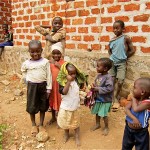 Of course, with any visit to the village, a little posse of curious kids trailed in behind us and spent some time wandering from room to room, watching me more than taking in the classrooms – obviously, as these classrooms practically sit in their back yard and well, wazungu don’t come around every day. As they warmed up to me, shared their names with me and started to laugh a little – we began shooting some pics. Each and every one of them is so beautiful and I just love hearing them laugh and seeing them smile!
Of course, with any visit to the village, a little posse of curious kids trailed in behind us and spent some time wandering from room to room, watching me more than taking in the classrooms – obviously, as these classrooms practically sit in their back yard and well, wazungu don’t come around every day. As they warmed up to me, shared their names with me and started to laugh a little – we began shooting some pics. Each and every one of them is so beautiful and I just love hearing them laugh and seeing them smile!
Two days after I arrived in Kigoma was Eid, the celebration of the end of Ramadan. I was glad when the day finally arrived because it seemed like there was some confusion about when it was to be. I was on the dala dala en route to Kiganza one day and had the great ‘pleasure’ of sitting in the midst of a screaming match between two Muslim men over when Eid would be. The elder of the two clearly had the upper hand in the argument and kept putting the younger one in his place, however that young fellah definitely fought back quite a bit, frowning and yelling. I didn’t pick up on everything but I knew they were arguing about the moon and when it would appear. I also heard them talking about the times before TV and radio and then I figured the older man was trying to teach the younger man about the world, a little bit.
Later, Lucas told me that, in fact, the older man was saying to the younger man – what do you think they did in the days before TV and radio; how do you think they knew it was Eid – do you think they had to wait for someone to ride into town and tell them? I wondered about this line of argument and Lucas said that they were also discussing the moon and how just because you don’t see the moon in Kigoma doesn’t mean that they didn’t see the moon elsewhere. They were talking about how at that very moment, they were seeing the moon in United States while we were in our early morning commute. They were also discussing cloud cover and other factors. Oh, it was just confusing – and I think everyone was hungry and ready for Eid. There had already been two false starts and now finally, Eid was upon us and everyone was ready to celebrate!
Every village was having a disco party and every family was having a great feast. Everyone was dressed in their best clothes – the outfits they only wear on holidays – shiny, clean, new outfits. Little girls in bright matching tops and skirts hugging their cute little bodies – fitting so well in fact that they were probably made just recently for the celebration. Little boys in three-piece suits and their best Sunday shoes, looking more like little men than children. All the women had their best hair, make-up and dresses on. Of course, not everyone is Muslim – but everyone is having an awesome day!
Lucas and I joined our friends Ashahadu and Jane for a feast in their home in Mgaraganza Village. (Pictured above – their son, Mickey chopping sugar cane and laughing with friends) Both Ashahadu’s and Jane’s mothers were there, a few of their siblings and other friends and relatives. Every guest who popped into the yard to say hello in passing jumped back with a little laugh when they saw me – whispering “mzungu?” before saying a little ‘eh eh’ with a smile and coming in, greeting everyone and finding a place to sit and chat while Jane and a few other women prepared dinner.
After dinner, Kalekwa (the watchman) brought his three kids by to visit – beautiful children!
After dinner, we chatted for over an hour with Ashadadu about his work in Gombe National Forest. He told us all about the chimps’ behaviors and about the different groups that live in Gombe. We learned all about how they navigate their habitat, how they mate, how they fight, how they are ostracized for trying to leave one group for another, how they are protected by their own – it seems like rough living for every creature in there from the bush bucks to the bush pigs, chimps and baboons… a daily struggle for life, space, peace. Ashahadu showed me recent pictures of him and Jane Goodall from her summer 2011 visit. He spends some time with her every time she comes … I’m envious! One of these years, maybe I’ll get to meet her.
Back at the hotel, I have a glass of wine, enjoy the Tanganyika sunset and chat with the folks working here who are friends to me after years of staying here. It’s just another nice thing about coming to TZ – Bennie, Asha, Kuluwa, etc. Great folks! Of course, after walking 1.5 hours a day, sitting around in the sun and pushing my brain to the limits with this new language, I sleep hard every night and store up for the next line of business.
In short, this week we have visited the village government, the district government, the Ministry of Education, the building site, the scholarship program students, many friends and the builders. I’ll tell more about some of these visits soon.
